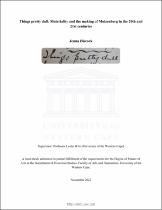| dc.description.abstract | The purpose of this research is to explore processes of historical production and ideas about public space in Muizenberg, South Africa. It argues that the dominant narrative told about Muizenberg from the late nineteenth and early twentieth centuries reinforces colonial hegemonyconcerning public space, development and progress. This research attempts to challenge andundermine this narrative. In order to do so, this research looks at postcards of Muizenberg as a way of re-readinghistory and historical production. Throughout, I explore whether the postcard can become anintervention for re-reading Muizenberg and its dominant histories. What can such a readingaddress? What sort of events are included in these dominant histories, who is present andabsent, and which representations are included or excluded by local historians? Beginning with anananalysis of the ‘golden years’ of Muizenberg, I problematise dominant production of Muizenberg’s history, and discuss how it is depicted on postcards, particularly within books produced by local historians. I engage with the postcard as a material object, looking at ‘more’ than its image, considering both its sides, and the stamps, addresses, messages, physical appearance, manufacturer, etc | en_US |

